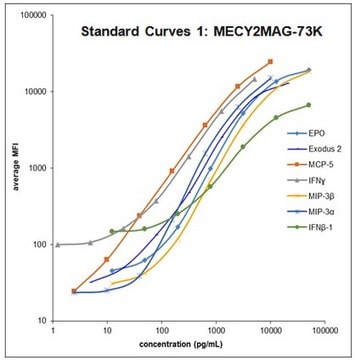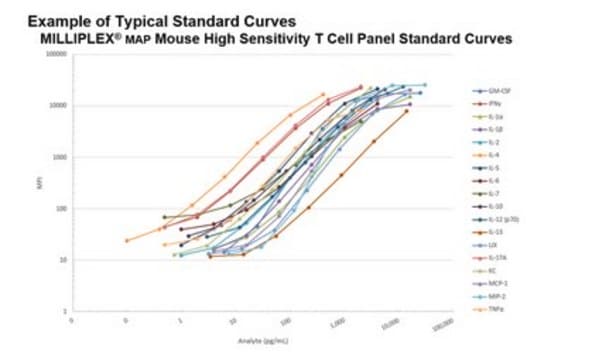MADCYMAG-72K
MILLIPLEX® Mouse Adipocyte Magnetic Panel - Endocrine Multiplex Assay
The analytes available for this multiplex kit are: Adiponectin, IL-6, Leptin, MCP-1, PAI-1 (Total), Resistin, TNF-α.
About This Item
Recommended Products
Quality Level
species reactivity
mouse
manufacturer/tradename
Milliplex®
assay range
accuracy: 85-98%
standard curve range: 12.2-50,000 pg/mL
technique(s)
multiplexing: suitable
detection method
fluorometric (Luminex xMAP)
shipped in
wet ice
General description
MILLIPLEX® Mouse Adipocyte Panel is a 7-plex kits used for the simultaneous quantification of any or all of the following analytes in mouse tissue culture supernatant samples: Adiponectin, IL-6, Leptin, MCP-1, PAI-1 Total, Resistin and TNFα. This kit uses a 96-well format, contains a lyophilized standard cocktail, two internal assay quality controls and can measure up to 38 samples in duplicate.
The Luminex® xMAP® platform uses a magnetic bead immunoassay format for ideal speed and sensitivity to quantitate multiple analytes simultaneously, dramatically improving productivity while conserving valuable sample volume.
Panel Type: Metabolism
Application
- Analytes: Adiponectin, IL-6, Leptin, MCP-1, PAI-1 (Total), Resistin, TNFα
- Recommended Sample Type: Mouse tissue culture supernatants
- Recommended Sample Dilution: 10 μL per well of tissue culture supernatant; dilution with an appropriate control medium may be required.
- Assay Run Time: Overnight (16-18 hours) at 2-8°C or 2 hours at room temperature (20-25°C).
- Research Category: Metabolism
- Research Subcategory: Endocrine, Obesity, Metabolic Disorders
Features and Benefits
Other Notes
Legal Information
Signal Word
Warning
Hazard Statements
Precautionary Statements
Hazard Classifications
Acute Tox. 4 Dermal - Acute Tox. 4 Inhalation - Acute Tox. 4 Oral - Aquatic Chronic 2 - Skin Sens. 1
Storage Class Code
10 - Combustible liquids
Certificates of Analysis (COA)
Search for Certificates of Analysis (COA) by entering the products Lot/Batch Number. Lot and Batch Numbers can be found on a product’s label following the words ‘Lot’ or ‘Batch’.
Already Own This Product?
Find documentation for the products that you have recently purchased in the Document Library.
Related Content
Multiplex immunoassays, such as MILLIPLEX® multiplex metabolic assays, are critical in metabolic syndrome research because they provide a full picture of the different conditions related to it, like diabetes and obesity, as well as save time and sample volume.
Multiplex immunoassays, such as MILLIPLEX® multiplex metabolic assays, are critical in metabolic syndrome research because they provide a full picture of the different conditions related to it, like diabetes and obesity, as well as save time and sample volume.
Multiplex immunoassays, such as MILLIPLEX® multiplex metabolic assays, are critical in metabolic syndrome research because they provide a full picture of the different conditions related to it, like diabetes and obesity, as well as save time and sample volume.
Multiplex immunoassays, such as MILLIPLEX® multiplex metabolic assays, are critical in metabolic syndrome research because they provide a full picture of the different conditions related to it, like diabetes and obesity, as well as save time and sample volume.
Our team of scientists has experience in all areas of research including Life Science, Material Science, Chemical Synthesis, Chromatography, Analytical and many others.
Contact Technical Service









